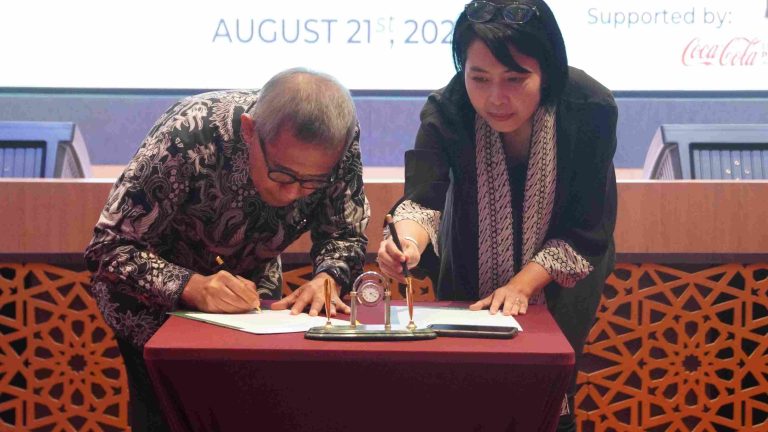Surabaya – After Universitas Nahdlatul Ulama Surabaya (Unusa) successfully deployed 1500 Ant Troops in commemorating the 1st century of Nahdlatul Ulama (NU), Coca-Cola Europacific Partners (CCEP) Indonesia trusted and collaborated with Unusa to succeed in the waste management and recycling program in East Java.
Regional Corporate Affairs Manager, Public Affairs Communications, and Sustainability (PACS) CCEP Indonesia, Armytanti Hanum Kasmito revealed, Unusa was chosen as a CCEP Indonesia partner because CCEP Indonesia had experience with Unusa regarding waste management, namely ant troops during the first century of NU.
“We see this as a good starting point for the program to be developed and expanded, so that the beneficiaries can become wider. Yesterday we practiced picking up trash and cleaning up trash, while on the other hand, the way of educating younger students can be strengthened. Besides they have experience in waste management, they can also get knowledge,” he said at the 9th floor Auditorium of Tower Unusa Campus B in the 3rd Brave Global Engagement Nahdlatul Ulama University of Surabaya (Genus), Monday (21/08).
Hanum added, in relation to the capacity that CCEP Indonesia has, the main focus is on waste management. However, it is important to note, that the support that CCEP offers can be adapted according to the facilities CCEP has and collaborates with the capacity owned by Unusa.
“This reflects our commitment to present appropriate and effective solutions in this collaboration. By combining the resources and capacities of both parties, we hope to create positive and broad-based results in waste management and sustainability efforts,” he said.
Hanum said CCEP Indonesia provided support in managing plastic waste, referring to CCEP’s ability to produce plastic waste based on various experiences in the industry. They believe that these experiences have the potential to have a positive and relevant impact on society.
“We are trying to capture our experience in managing plastic waste and share this insight with the wider community. In this way, we hope to inspire others and encourage positive changes in perspectives and actions regarding the issue of plastic waste management. Collaboration with various parties, including Unusa, because it can help expand the impact of business and help create bigger changes in the environment and community behavior,” he said.
Unusa Chancellor, Prof. Dr. Ir. Achmad Jazidie, M.Eng., said, after successfully participating in a century of NU activities, namely fielding 1500 Ant Troops. Unusa is trusted by CCEP Indonesia in succeeding and overseeing the waste management and recycling program in East Java, through the signing of a Memorandum of Understanding (MoU), namely collaboration in the field of improving the quality of human resources, academics and community service.
Jazidie continued, universities play an important role in promoting and implementing waste management and recycling practices in society. Universities have a major role in providing education and training to students about the importance of waste management and recycling.
“Educational programs that cover environmental and sustainability issues can help educate young people about the negative effects of improper waste disposal and how to overcome them. In addition, research in universities can provide new insights about the latest technology and methods in the field of recycling and waste management,” he said.
Universities have the resources to develop and test new technologies in recycling and waste management. Innovations such as more efficient recycling methods or waste reduction solutions can help solve existing environmental challenges.
“Universities have great potential to shape a culture of sustainability and become agents of change in changing people’s behavior regarding waste management and recycling. Through education, research, and concrete actions, universities can play an important role in creating a cleaner and more sustainable environment,” he said. (Humas Unusa)

